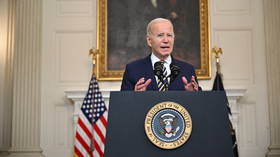US credibility ‘hanging in balance’ – Washington’s envoys

Several US ambassadors have signed a letter urging lawmakers to approve a $118 billion bill with funds for Ukraine, Israel, and border security, warning that failure to do so would undermine Washington’s diplomatic clout.
The long-debated compromise bill – which also includes aid for American partners in the Indo-Pacific seeking to deter China – was unveiled several days ago to immediate Republican pushback. It allocates far less money for border security than for foreign military assistance.
The White House has been pushing Congress to approve a supplemental funding package for several months amid growing concerns that Ukraine will struggle to hold off Russia without US support. Republicans, however, have been dragging their feet, demanding more measures to improve security on the southern US border.
On Sunday, Senate Republicans and Democrats released the text of a $118 billion compromise package. About $60 billion is allocated for Ukraine, with $14 billion destined for Israel and $4.8 billion to support Washington's Indo-Pacific “partners” amid tensions with China. Of the total, only $20 billion would go to border security.
While endorsed by US President Joe Biden, the bill was heavily criticized by Republican House Speaker Mike Johnson. He argued that the bill “is even worse than we expected, and won’t come close to ending the border catastrophe” which he said was orchestrated by Biden.
With the bill on the verge of collapse, the New York Times on Tuesday shared a letter by US ambassadors to South Korea, Japan, Australia, the Philippines, India, China, New Zealand, Malaysia and Vietnam urging lawmakers to pass the measure.
The envoys noted that none of them had ever signed such a letter before but said that they believed it was vital to express their “direct and honest assessment” of the “essential” funding request.
”Governments are watching what we do at this pivotal moment in history,” the envoys wrote, adding that Washington’s allies and partners “want to see that when the chips are down, the United States will be there” for them.
”Not only will our allies and partners take stock of this moment, so will our adversaries,” the letter noted. “The credibility of our commitment to collective security and deterrence hangs in the balance.”
Ukrainian Foreign Minister Dmitry Kuleba said last month that Kiev had no plan B if the US – which is its main backer in terms of military assistance – cuts off its aid, while insisting that the West has “sufficient resources” to meet Ukraine’s needs.
At the same time, Moscow has repeatedly denounced Western assistance to Kiev, warning that it will only prolong the conflict without changing its ultimate outcome.













